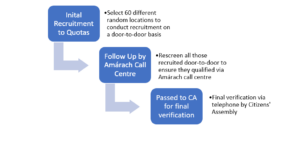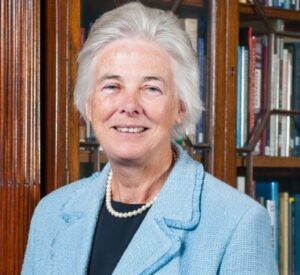Members
Members

Citizens' Assembly on
Gender Equality
Selection of Members
Membership of the Assembly consisted of 100 people, comprising a Chairperson and 99 citizens entitled to vote at a referendum. Dr Catherine Day, former Secretary General of the European Commission, was appointed by the Government to Chair this Assembly.
Please navigate through the menu below for information on the selection of members for this Assembly.
Recruitment Process
Following a competitive tendering process, Amárach Research was appointed on 11 November 2019 to provide a representative sample of 99 members for the Citizens’ Assembly. Recruitment took place from November 2019 to February 2020.
All 99 citizens were required to be entitled to vote at a referendum and were recruited throughout the Republic of Ireland via random selection in accordance with best recruitment practice, as advised by industry experts, so as to be broadly representative of Irish society (using the 2016 Census for guidance).
A detailed random multi-level approach was used for the development of a representative sample frame that could be used for the recruitment of both full members and substitutes to the Assembly. This was done in accordance with Census 2016 data to ensure that sample points were nationally representative in terms of regional spread, ensuring we had the correct number of points in different locations based on population.
Detailed demographic quotas were also set to ensure the sample was representative of all adults based on Census 2016, with quotas based on gender, age and region. Interviewers then called to each sample point and interviewed householders at every nth house to fill their recruitment quotas and to capture contact details for verification.
Amárach used a three-stage recruitment process as follows:

Certain categories of citizens were excluded via the screening process, including:
- Certain categories of politicians and political party members
- Journalists and others working in the media
- Those campaigning on aspects of gender equality
- Those not eligible to vote in a referendum
Direct applications from members of the public to take part in the Assembly were not accepted, as the members of the Assembly had to be chosen at random to ensure a completely unbiased approach and be broadly representative of all citizens using demographic variables as reflected in the Census. While some members may live in the same area interviewers were not allowed to recruit friends or family together.
The two-stage verification process ensured that those not eligible to be part of the Citizens’ Assembly or who were not recruited via the proper procedure are not included in the final composition of the Assembly.
Impact of Covid-19
Due to Covid 19 and resulting restrictions in public gatherings, after just one-weekend meeting, the Citizens’ Assembly had to postpone its meetings scheduled for March, April, May and July (which had been intended as the last meeting of the Assembly). The resulting extension to the work of the Assembly, as well as changed circumstances for some members, led to a limited number of members having to leave the process before the Assembly resumed its work online in October 2020. It should be noted that some turnover of members was also a feature of the previous Citizens’ Assembly and had been anticipated at the outset.
The Assembly was therefore able to replace some of these members through a substitutes panel which had also been recruited door-to-door as set out above. However, there were some vacancies involving certain combinations of demographic variables which were not sufficiently available on the substitutes panel.
Due to public health restrictions, a door-to-door recruitment method could not be used. Therefore, Amárach recommended recruiting by telephoning members of its existing research panel of nearly 5,000 adults who met the socio-demographic profile of the existing vacancies. A large number of members of the Amárach panel were previously recruited randomly by door-to-door and telephone recruitment methods. Therefore candidates recruited by these methods were deemed eligible to fill existing vacancies if they met all other criteria. Similar to previously recruited members, those approached needed to be eligible to vote in a referendum. Politicians, their families and political party officeholders; journalists and others working in the media and market research and those campaigning on aspects of gender equality were ineligible.
The same two-stage verification process for members as applied to the original members was used.
The Chair of the Citizens' Assembly on Gender Equality
The Assembly was chaired by Dr. Catherine Day, former Secretary General of the European Commission.
Catherine Day is a former Secretary General of the European Commission, a post she held from 2005 to 2015. She is the first woman to hold this post.  Prior to her appointment as Secretary General she was Director General for Environment. She worked in the external relations department of the European Commission as deputy Director General, reporting to Chris Patten. She worked on the future enlargement of the EU in the 1990s and was one of the architects of the pre-accession process for the countries of central and eastern Europe. Catherine worked in the Cabinets of Commissioners Richard Burke, Peter Sutherland and Leon Brittan and joined the European Commission in 1979.
Prior to her appointment as Secretary General she was Director General for Environment. She worked in the external relations department of the European Commission as deputy Director General, reporting to Chris Patten. She worked on the future enlargement of the EU in the 1990s and was one of the architects of the pre-accession process for the countries of central and eastern Europe. Catherine worked in the Cabinets of Commissioners Richard Burke, Peter Sutherland and Leon Brittan and joined the European Commission in 1979.
She has a B.A in economics and politics and an M.A. in international trade from UCD. She holds honorary doctorates from UCD and University of Limerick.
Catherine now chairs the Governing Body of University College Cork and the Board of Trustees of the Chester Beatty Library. She is on the board of the European Movement Ireland, the Institute of International and European Affairs in Dublin and the Irish Times Trust. She was a special adviser to the former resident of the European Commission, Mr Jean-Claude Juncker until 1 December 2019. She was elected to membership of the Royal Irish Academy in 2016. In 2017/2018, at the request of the Minister for Health, she chaired an independent review group to examine the role of voluntary organisations in publicly funded health and personal social services in Ireland.
List of Members
Click here for a list of current Members of the Assembly.

